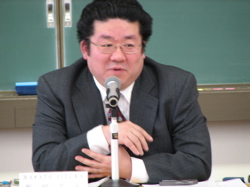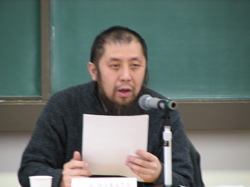Center for Interdisciplinary Study of Monotheistic Religions(CISMOR)Doshisha University
> Archives > 21st Century COE Program Archive > Research Groups > Research Group2 > 2006-0521st Century COE Program Archive
2006-05
| Date: | January 27, 2007 (Sat) 13:00-17:30 (Jointly held with Group 1) |
|---|---|
| Location: | Meeting Room, Neisei-kan 5F, Imadegawa Campus, Doshisha Universit |
| Theme: | Contemporary Islam |
| Speaker: | Masato Iizuka (Professor, Tokyo University of Foreign Studies) Ko Nakata (Professor, Doshisha University) |
| Summary: | |
| For the purpose of further progress in the interdisciplinarity of this C.O.E. program, two research groups were convened jointly on the theme of "Islam Today," which has been debated in recent conferences. The questions from participants to the two presenters were solicited in advance, and the lectures of Professors Nakata and Iizuka were given as replies to those questions. Many questions focused, first, on the relationship between religion and politics in the Islamic world, such as heightened interest in democratization in Islamic states, the relationship between Shari’a (Islamic law) and legislative power under the assembly, the differentiation between the public and private spheres, the political role played by religious people such as the Ulama’ (Islamic scholars), and the ideal political regime from the viewpoint of Islam. Other questions dealt, for example, with the relationship between Muslims and Christians in Malaysia, the Roman Pope’s understanding of Islam, and American diplomacy in Middle East. These questions were focused on the possibilities for progress in the dialogue between the Islamic world and the non-Islamic world, or Muslims and non-Muslims. In his answers, Professor Nakata first presupposed that there was nothing that could be called the Islamic world, and if there were one, it had been covered over by a Western political paradigm. By this he meant that most of the issues we regard as being salient in Islam and the Islamic world are ones that had been brought in through the encounter with the West and Western regimes. Hence, to answer problems noted above such as democratization, Prof. Nakata picked up on the role which liberal democracy assumes of defending natural right and replied by replacing democratization with governance by Shari’a. The lecture given by Prof. Nakata was 'Islam studies' from the perspective of ideal Islam and its theory. Then Professor Iizuka gave a lecture with the same presuppositions as Prof. Nakata’s, focusing not on Islam but, instead, on Muslims. Thus he made the point that Muslims do not always reflect Islam sufficiently, in other words, that 'real' Muslims don’t always live in conformity with Shari’a but give in too much to lusts. So there are many unserious Muslims from the viewpoint of ideal Islam and this has to be recognized, according to the lecturer. Hence, Prof. Iizuka regarded his response, analyzed through interview research, as 'Muslim studies.' He classified the problem in four topics-Fundamentalism, Muslims and non-Muslims, Shari’a and Politics, and Evolutionary theories and Islamic thought-and examined in his reply the function of setting up 'Islam' while not denying that, because Muslims and Islamic states sometimes set up 'Islam,' this position is often just a slogan under the banner of Islam. In the discussion that followed the lectures, after some clarification of political regimes in Islamic states, there arose arguments about the available models of political regime and the differences between Islamic states and those of the West. The discussion was carried forward with a focus on the view of evolutionary theories in academia, regional politics in Iran and Malaysia, and other subjects. Discussing 'Islam Today' at this joint meeting was beneficial not only for sustaining comprehension among participants, but also for the group researches to reach common views and mutual understanding for future meetings. Kenichiro Takao (CISMOR Research Assistant / Graduate Student, School of Theology, Doshisha University) |
|

